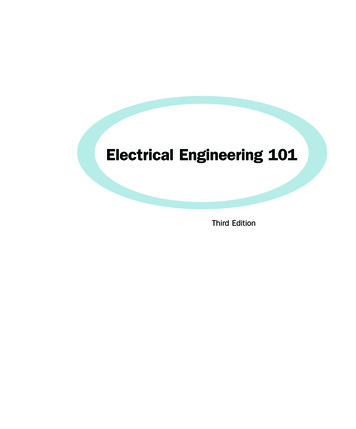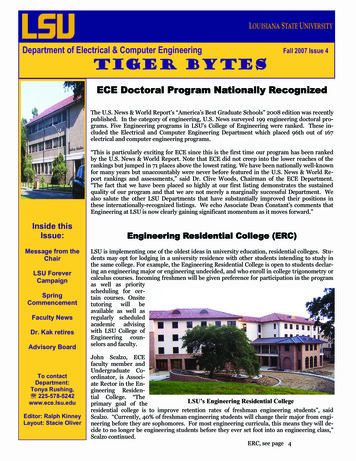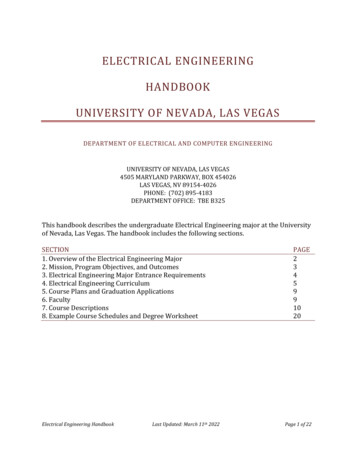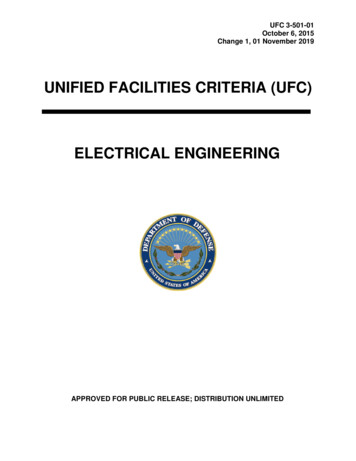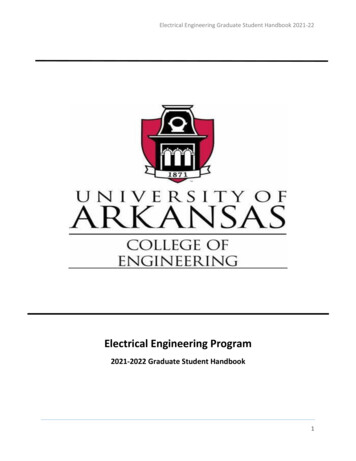
Transcription
AElectrical andCommunicationsEngineeringElectrical and Communications Engineering Programme Handbook (undergraduates)Undergraduate Student’sProgramme HandbookDecember 2020Electrical Engineering BUE
AElectrical and Communications Engineering Programme Handbook (undergraduates)Undergraduate Student’sProgramme Handbook forElectrical and CommunicationsEngineeringThe British University in EgyptDecember 2020Programme Handbooks are issued and maintained by theFaculty of Engineering, BUEElectrical Engineering BUE
Electrical and Communications Engineering Programme Handbook (undergraduates)Contents34Welcome from the department's staffA5Why Electrical and Communications Engineering?B6Module contentsC24 Grading systemsD26 Summer training internshipsE27 Quick students’ guideF28 Academic staffG31 Resources and facilitiesHElectrical Engineering BUE
AElectrical and Communications Engineering Programme Handbook (undergraduates)A. Welcome from the department's staffHave you ever thought about how voice anddata travel over the air?Did you ever wonder how does computernetworks work and why optical fibernetworks provide higher internet speeds?Do you want to learn how to build anautomatic control system?Do you have an idea of your own that you areeager to learn how to make it come true?If so . then, you’ve arrived at the rightdestination.In ECE@BUE, we strive to help studentsdiscover their limitless potential and have asuccessful career in the field of Electrical andCommunications Engineering (ECE).Throughout the journey in the ECEprogramme, students learn not only thefundamentalsofElectricalandCommunications Engineering, but also themost-recent advances in the field wherepractical work is integrated with thetheoretical background to prepare thestudents for a successful career and/orcontinued-education.The Electrical Engineering Department iscomprised of highly qualified and professionalteaching staff including professors and lecturers,as well as supporting staff including teachingassistants, lab engineers and administrativeassistants.The department has multiple laboratories servingundergraduate modules, projects as well asscientific research.In the following sections, we have provided someuseful information pertaining to the ECEprogramme as follows: The structure of the department, its staff, and itsprogrammes. The tree of modules which you need to pass toreceive your degree. Additional information such as the gradingsystem, summer training internships, exchangeprogrammes, academic misconduct policies, eLearning system, facilities, and others.The ECE programme is offered by theElectrical Engineering (EE) Department, themembers of which work in a professionalharmony to achieve excellence in teaching,scientific research and student satisfaction,and to help students have a beneficial,fruitful, and enjoyable learning experience.4Electrical Engineering BUE
BElectrical and Communications Engineering Programme Handbook (undergraduates)B. Why Choose Electrical and CommunicationsEngineering (ECE)?The world we live in has dramatically changeddue to the evolution of high-speedcommunication systems and the widespreadof mobile devices, which has created anincreased demand for highly qualifiedengineers to operate, maintain, design, andimplement such systems.Offering the Electrical and CommunicationsEngineering (ECE) Programme, the ElectricalEngineering Department at the BUE aspiresto play a role in supplying the Egyptian andthe international markets with the engineerswho can shape the future.The ECE programme is designed to providethe students with a balanced learningexperience which is composed of theoreticalbackground as well as practical work inlaboratories and projects in order to preparethe students to become tomorrow’sprofessional Electrical and Communicationsengineers.Throughout the four years of study in theprogramme, students learn a wide variety ofspecialized modules, starting with coremathematical modules, basic electric circuitsand electronics, signals analysis andcomputer programming in DYR1.Moving on towards DYR3, more advancedmodules are covered such as digitalcommunications, digital signal processing,computer networks and optical systems.Approaching final study year, students will learnabout antennas, embedded systems as well as avariety of optional modules which cover the upto-date topics in optical fibers, artificialintelligence, digital image processing, mobilecommunications, RF systems and Radar systems.Additionally, in the final year of study studentswork on a design graduation project as well as aresearch graduation project in which the studentsuse all what they have learned and digestedthroughout the four years of the program toresearch, design, and implement a solution toreal-life problemsWhether you want to work in an electronicdevices design firm or in a mobilecommunications company, in giant corporationslike Intel and Google or in a start-up company; ECEprogramme is the place for you, it offers a worldclass student-centred learning experience with acutting edge in research, design, anddevelopment of electronics, electrical andcommunications systems that power the future.In DYR2, modules in electromagnetics,measurements, computer organization andanalog communications are studied.5Electrical Engineering BUE
CElectrical and Communications Engineering Programme Handbook (undergraduates)C. Module contentsIn this programme, emphasis is placed onthe fundamentals of electrical andcommunications engineering principlesand design techniques.Students will learn the basic engineeringand scientific concepts through a series ofmandatory modules and a set of optionalmodules in several areas of essing,WirelessandMobileCommunications, Control Systems Design,RF and Microwave, Optics, EmbeddedSystems, and Computer Architecture.Each module in the program has a level.Levels at the BUE reflect the standards adopted by the UK’s Higher EducationQualifications Framework (HEQF). They areclassified as follows:Level P (Preparatory). Taught in thepreparatory year of the engineeringprogramme at BUE.Level I (Intermediate). Taught in degree year 3and some modules in degree year 2 of theengineering programs at BUE.Level H (Honors). Taught in degree year 4 andsome modules in degree year 3 of theengineering programme at BUE.The following listing provides a summary ofthe modules covered in each degree year ofthe programme, including information onmodule's corresponding credit weight,prerequisites, semester taught in, relatedkeywords, and a brief description of topicscovered.Note that each module has a unique code. Thelist provides only the basic code of the module(e.g. ECE01C), but in practice this code will beprefixed with two digits indicating the currentacademic year. For example, if the module Isdelivered in the academic year 2020-2021,then the code ECE01C will be prefixed by '20',to give 20ECE01C.Level C (Certificate). Taught in degree year1 and some modules in degree year 2 of theengineering programme at BUE.6Electrical Engineering BUE
CElectrical and Communications Engineering Programme Handbook (undergraduates)Year 1 modules (120 credits at level C)Module’s 01010101010Module’s nameElectric Circuits (1)Solid State ElectronicsReport Writing and Data PresentationCalculusComputer ProgrammingEntrepreneurship: Theory and PracticeElectric Circuits (2)Electronics (1)Digital DesignDifferential EquationsSignals and SystemsEngineering Project ManagementSemester111111222222Year 2 modules (40 credits at level C and 80 credits at level I)Module’s 1010101010Module’s nameElectronics (2)Electromagnetic Fields (1)Probability and StatisticsMaths for CommunicationsElectrical PowerComputer OrganizationElectronic Measurement and InstrumentationComputer ArchitectureAnalog CommunicationsElectromagnetic Fields (2)E&C: Law, Standards and PracticeApplied Numerical TechniquesSemester111111222222Electrical Engineering BUE
CElectrical and Communications Engineering Programme Handbook (undergraduates)Year 3 modules (80 credits at level I and 40 credits at level H)Module’s 10101010Module’s nameDigital Communications (1)Electromagnetic WavesEngineering EconomicsControl SystemsElectronics (3)Computer NetworksDigital ControlDigital Communications (2)Microwave EngineeringDigital Signal ProcessingOptical SystemsDigital ElectronicsSemester111111222222Year 4 modules (120 credits at level H)Module’s 201010101010101010Module’s nameResearch Project [1:1]Design Project [1: 1]Digital Communications (3)Antennas and Propagation (1)Optional (1)Optional (2)Digital Communications (4)Embedded SystemsOptional (3)Optional (4)Semester1&21&211112222Electrical Engineering BUE
CElectrical and Communications Engineering Programme Handbook (undergraduates)Optional modules (1)Module’s ��s nameNetwork SynthesisFiber Optic CommunicationsEnergy Harvesting SystemsArtificial IntelligenceSemester1111Module’s nameDigital Image ProcessingOptoelectronicsWireless CommunicationsVLSI TechnologySemester1111Module’s nameRF Systems DesignMobile CommunicationsAntennas and Propagation (2)Wireless Sensor NetworksSemester2222Module’s nameRadar System and TrackingSoftware Defined RadioSelected Topics in Communications EngineeringSelected Topics in Electronics EngineeringSemester2222Optional modules (2)Module’s l modules (3)Module’s l modules (4)Module’s ical Engineering BUE
CElectrical and Communications Engineering Programme Handbook (undergraduates)Y1 modules:Module code: ECE01CDegree Year: 1Keywords:Brief aim/scope:Title: Electric Circuits (1)Semester: 1Credits: 10Prerequisites: SCIB03P,SCIB04PDC circuits, Ohm's law, Kirchhoff's laws, Nodal Analysis, Mesh Analysis, Thevenin's andNorton's theorems, Superposition theoremThe aim of this module is to introduce entirely in context the basic mathematical methodsrequired to begin the study of Electrical Engineering and the basic laws and theoremsconcerning the solution of Direct Current electrical circuits and systems and the basicmathematical techniques of electric circuit solutionModule code: ECE02CTitle: Solid State ElectronicsDegree Year: 1Semester: 1Credits: 10Prerequisites:Keywords:Brief aim/scope:The aim of this module is to give students an understanding of the concept of crystalstructures, bonding properties, energy band theory, carrier distribution andrecombination, theory of transport and scattering.Module code: ECE03CTitle: Report Writing and Data PresentationDegree Year: 1Semester: 1Credits: 10Prerequisites:Keywords:Brief aim/scope:The aim of this module is to provide engineering students with all basic concepts thatqualify them to be able to communicate technical information effectively through writingtechnical reports and presentationsModule code: SCIB01CDegree Year: 1Keywords:Brief aim/scope:Title: CalculusSemester: 1Credits: 10Prerequisites: SCIB01P,SCIB03PThe aims of this module are to ensure that all students have a basic knowledge andunderstanding of vector calculus and also provide basic cognitive and practical skillsrequired for future study. This module extends the aims and content of the preparatoryyear mathematics. Additionally this module seeks to extend their range of mathematicalskills and techniques to use them in more difficult unstructured problems, and to gain adeeper understanding of mathematical modelling, especially with regard to engineeringapplications of vector calculus.Module code: ECE12CTitle: Computer ProgrammingDegree Year: 1Semester: 1Credits: 10Prerequisites:Keywords:Structured Programming- High-level LanguageBrief aim/scope:The aim of the module is to introduce the concepts of computational thinking andalgorithmic reasoning. The students will develop the skill of designing and writingstructured programming through the use of a structured programming language such asC/C .10Electrical Engineering BUE
CElectrical and Communications Engineering Programme Handbook (undergraduates)Module code: ENGG03CTitle: Entrepreneurship: Theory and PracticeDegree Year: 1Semester: 1Credits: 10Prerequisites:Keywords:Brief aim/scope:The main aim of this module is to provide an understanding of the basic and essentialissues in entrepreneurship and to provide some of the skills the student will need tobecome an entrepreneur or to act entrepreneurially within existing organizationalsettings. It is an integrative module addressing both the theoretical and practical issues ofentrepreneurship.Module code: ECE04CTitle: Electric Circuits (2)Degree Year: 1Semester: 2Credits: 10Prerequisites:Keywords:AC circuits, Three-phase systems, Vectors, and Phasors, RMS Value, Apparent Power andPower Factor, Power Factor Correction.Brief aim/scope:The aim of this module is to introduce entirely in context the basic mathematical methodsrequired to begin the study of Electrical Engineering and the basic laws and theoremsconcerning the solution of Alternating Current electrical circuits and systems and the basicmathematical techniques of electric circuit solution.Module code: ECE05CTitle: Electronics (1)Degree Year: 1Semester: 2Credits: 10Prerequisites:Keywords:Brief aim/scope:The aim of this module is to give students an introduction to the characteristics, operationand the structure of electronics devices like diodes, bipolar transistor and field effecttransistors.Module code: ECE10CTitle: Digital DesignDegree Year: 1Semester: 2Credits: 10Prerequisites: ELEC02CKeywords:Brief aim/scope:This course aims to provide students with an advanced treatment of digital design in thecontext of an introduction to the design of VLSI systems. Students are introduced to adesign methodology which encompasses the range from logic models and circuitsimulations to high-level specification techniques.Module code: SCIB02CDegree Year: 1Keywords:Brief aim/scope:11Title: Differential EquationsSemester: 2Credits: 10Prerequisites: SCIB01P,SCIB03P, SCIB05PThe aim of this module is to ensure that students have a basic knowledge andunderstanding of differential equations. In particular, this module seeks to ensure thatstudents understand the different types of differential equations; are aware of and havethe ability to apply different methods for the solution of differential equations; are awareof special functions; and have an understanding of Laplace transforms and theirapplications.Electrical Engineering BUE
CElectrical and Communications Engineering Programme Handbook (undergraduates)Module code: ECE06CDegree Year: 1Keywords:Brief aim/scope:Title: Signals and SystemsSemester: 2Credits: 10Prerequisites: SCIB03P,SCIB05PThe aim of this module is to introduce relevant mathematical concepts to describe bothcontinuous-time and discrete-time signals and systems, and to equip the student with themathematical tools that would allow him/her to design and/or analyses a linear timeinvariant systemModule code: ENGG01CTitle: Engineering Project ManagementDegree Year: 1Semester: 2Credits: 10Prerequisites:Keywords:Brief aim/scope:The aim of this module are to introduce the methods and tools required for the planning,scheduling, cost and human resource control, and monitoring of a project and to usethese in the execution of a simple project in the relevant subject area12Electrical Engineering BUE
CElectrical and Communications Engineering Programme Handbook (undergraduates)Y2 modules:Module code: ECE02ITitle: Electronics (2)Degree Year: 2Semester: 1Credits: 10Prerequisites:Keywords:Brief aim/scope:The aims of this module are to enable students to analyses, design and evaluate practicalelectronic circuits and systems.Module code: ECE08CTitle: Electromagnetic Fields (1)Degree Year: 2Semester: 1Credits: 10Prerequisites:Keywords:Brief aim/scope:The aims of this module are to introduce the student to the concepts of electro- andmagneto static electromagnetic fields, with emphasis on understanding their importanceto electrical and communication engineering, their applications and their analysistechniques, including the necessary mathematical tools often used in studying them.Module code: SCIB06CTitle: Probability and StatisticsDegree Year: 2Semester: 1Credits: 10Prerequisites: SCIB01CKeywords:Brief aim/scope:The aim of this module is to provide necessary mathematical foundation in probability,statistics, and random processes for engineers.Module code: ECE03ITitle: Math for CommunicationsDegree Year: 2Semester: 1Credits: 10Prerequisites: SCIB02Keywords:Brief aim/scope:The aims of this module are to provide the student with the basic understanding and skillsin mathematics and the ability to use mathematics with confidence underpins a successfulengineering degree and to give students the knowledge to apply mathematics to practicalengineering problems. The content is specifically related to topics associated withelectronics and communications engineeringModule code: ECE07CDegree Year: 2Keywords:Brief aim/scope:Title: Electric PowerSemester: 1Credits: 10Prerequisites: ECE01C,ECE05CThe aim of this module is to use relevant equivalent circuit concepts to illustrate thebehavior of transformers, DC and induction machines. This module is an introduction tothe control modules in further semesters.Module code: ECE14CTitle: Computer OrganizationDegree Year: 2Semester: 1Credits: 10Prerequisites: COMP05CKeywords:Brief aim/scope:This course covers the basics of computer organization with emphasis on the lower levelabstraction of a computer system including digital logic and instruction set.13Electrical Engineering BUE
CElectrical and Communications Engineering Programme Handbook (undergraduates)Module code: ECE05ITitle: Electronic Measurements and InstrumentationDegree Year: 2Semester: 2Credits: 10Prerequisites:Keywords:Brief aim/scope:The aim of this module is to provide students with the background of instrumentation andmeasurement in the field of electrical and communications engineering including selectedtopics at the cutting edge.Module code: ECE14IDegree Year: 2Keywords:Brief aim/scope:Title: Computer ArchitectureSemester: 2Credits: 10Prerequisites:17COMP03CThe module aims to provide students with the fundamental knowledge of digital computerarchitecture. Students will get to realize the relation between the instruction setarchitecture and its hardware realization in terms of microarchitecture designs and theirdifferent tradeoffs.Module code: ECE12ITitle: Analog CommunicationsDegree Year: 2Semester: 2Credits: 10Prerequisites:Keywords:Brief aim/scope:The aim of this module is to provide the student with a foundation for analoguecommunication theory, including different types of signaling and analogue modulationschemes, with applications, and introducing key noise calculations and system tradeoffsModule code: ECE13ITitle: Electromagnetic Fields (2)Degree Year: 2Semester: 2Credits: 10Prerequisites: ECE01IKeywords:Brief aim/scope:The aims of this module are to introduce the student to the concepts of time-varyingelectromagnetic fields, with emphasis on understanding their importance to electrical andcommunication engineering, their applications, and their analysis techniques, includingthe necessary mathematical tools often used in studying themModule code: ECE04ITitle: E &C Law, Standards and PracticeDegree Year: 2Semester: 2Credits: 10Prerequisites:Keywords:Brief aim/scope:The aim of this module is to introduce to students legal and other frameworks at bothnational and international level of relevance to electronics and communicationsengineering.Module code: SCIB20IDegree Year: 2Keywords:Brief aim/scope:14Title: Applied Numerical TechniquesSemester: 2Credits: 10Prerequisites: SCIB01C,SCIB02CThe aims of this module are to ensure that all students will have a basic knowledge andunderstanding of how to set up and solve mathematical problems numerically and to applythis knowledge to the solving of electrical engineering problems using appropriatesoftware packages.Electrical Engineering BUE
CElectrical and Communications Engineering Programme Handbook (undergraduates)Y3 modules:Module code: ECE16ITitle: Digital Communications (1)Degree Year: 3Semester: 1Credits: 10Prerequisites: ECE12IKeywords:Digital communications, source formatting, signal conversion, baseband modulationand detection, bandpass modulation and detection.Brief aim/scope:The aims of this module are to introduce the students to the principles of digitalcommunications systems; to appreciate the differences, advantages anddisadvantages of analogue vs. digital method of communication; and to understandthe basic operation and tradeoffs that exist in modern digital communication systems.Module code: ECE17ITitle: Electromagnetic WavesDegree Year: 3Semester: 1Credits: 10Prerequisites: ECE13IKeywords:Electrodynamics, plane waves, transmission lines, Smith chart, matchingBrief aim/scope:The aims of this module are to introduce the student to the concepts of high frequencyguided electromagnetic waves and their propagation in transmission lines andwaveguides, with emphasis on understanding their importance to electrical andcommunication engineering, their applications and their analysis techniques, including thenecessary mathematical tools often used in studying them.Module code: ENGG03I Title: Engineering EconomicsDegree Year: 3Semester: 1Credits: 10Prerequisites:Keywords:Interest rate, depreciation, break-even point, replacement decision.Brief aim/scope:The aim of this module is to introduce the student to the concepts and methods ofeconomic analysis and provide the student with information necessary to help him/herin decision making to assess cost implications in engineering design and applications toselect the preferred course of actions based upon monetary considerations.Module code: ECE15ITitle: Control SystemsDegree Year: 3Semester: 1Credits: 10Prerequisites:Keywords:Control systems, open-loop characteristics in time and frequency domains.Brief aim/scope:The aims of this module are to understand and analyze control systems, and develop theirperformance specification, design control systems to meet specifications, use MATLAB tosimulate, analyze and aid the design of control systems and furnish the student'sunderstanding of both theoretical and practical issues in classical control theories andsystems.Module code: ECE18ITitle: Electronics (3)Degree Year: 3Semester: 1Credits: 10Prerequisites: ECE01IKeywords:Analog electronic circuits, power amplifiers, sinusoidal & non-sinusoidal waveforms,Pspice.Brief aim/scope:The aims of this module are to enable students to construct, analyze, verify, andtroubleshoot analog electronic circuits using appropriate techniques and test equipment.15Electrical Engineering BUE
CElectrical and Communications Engineering Programme Handbook (undergraduates)Module code: ECE19ITitle: Computer NetworksDegree Year: 3Semester: 1Credits: 10Prerequisites:Keywords:Data networks, protocols, network service models and network topologies.Brief aim/scope:The aims of this module are to learn the fundamentals of communication networks ingeneral and gain a better understanding of the Internet in specific. The module providesan understanding of the layered network architecture and the protocols operating at thedifferent layers, the different network service models and the model delivered by theInternet, and the different network performance parameters and their evaluation. Themodule discusses recurrent network related concepts including framing, encoding, reliabledata transfer, addressing, routing, and forwarding. In addition the module surveysdifferent network topologies and technologies such as Ethernet and Wireless LANs.Module code: ECE19HTitle: Digital ControlDegree Year: 3Semester: 2Credits: 10Prerequisites: COMPO4IKeywords:Feedback control, z-domain, s-domain, digital control system.Brief aim/scope:The aim of this module is to provide an introduction to both the theoretical and practicalproblems of applying feedback control by means of the computer through the basiccontrol theories that have been studied before.Module code: ECE20HTitle: Digital Communications (2)Degree Year: 3Semester: 2Credits: 10Prerequisites: ECE16IKeywords:Digital communications, signals, noise, information theory.Brief aim/scope:The aims of this module are to introduce the students to the principles of digitalcommunications systems; understand the basics of modulation concepts, the basics ofsignal-space analysis, and the concepts of digital transmission.Module code: ECE21HTitle: Microwave EngineeringDegree Year: 3Semester: 2Credits: 10Prerequisites: COM17IKeywords:Microwave circuits, microwave networks.Brief aim/scope:The aims of this module are to introduce the student to microwave circuits and systems,microwave networks and key system calculations, with emphasis on understanding theirimportance to electrical and communication engineering, their applications and theiranalysis techniques, including the necessary mathematical tools often used in studyingthem.Module code: ECE22HTitle: Digital Signal ProcessingDegree Year: 3Semester: 2Credits: 10Prerequisites: ECE06CKeywords:law, standards, regulationsBrief aim/scope:The aims of this module are to provide students with a theoretical and mathematical basisfor the analysis and processing of digital signals; provide students with a foundation fordigital filtering and its applications.16Electrical Engineering BUE
CElectrical and Communications Engineering Programme Handbook (undergraduates)Module code: ECE20ITitle: Optical SystemsDegree Year: 3Semester: 2Credits: 10Prerequisites:Keywords:Optical , communication systems, lasing materials and design of optical elements.Brief aim/scope:The aim of this module is to provide engineering students with a thorough understandingof basics of optical systems and communication systems based on light propagation anddesign requirements for different applications. In addition, the module helps to familiarizestudents with LASERs, lasing materials and design of optical elements used in suchapplications.Module code: ECE21IDegree Year: 3Keywords:Brief aim/scope:17Title: Digital ElectronicsSemester: 2Credits: 10Prerequisites: ECE02I,ECE18Ilaw, standards, regulationsThe aim of this module is to provide students with all information about: Digital signalsand systems, pulse waveforms, switching circuits, pulse distortion, RC circuits, Exponentialform RC and periodic pulse waveforms.Electrical Engineering BUE
CElectrical and Communications Engineering Programme Handbook (undergraduates)Y4 modules:Module code: ECE24HTitle: Research ProjectDegree Year: 4Semester: 1Credits: 20Prerequisites:Keywords:Individual research, presentation, report.Brief aim/scope:The aims of this module are to provide the student with experience in researchprocess and methodology by defining and studying a problem on an individual basis.Module code: ECE25HTitle: Design ProjectDegree Year: 4Semester: 1Credits: 20Prerequisites:Keywords:Individual design, presentation, report.Brief aim/scope:The aim of this module is to present the students with the experience of the designprocess from preparation of the brief through to detailed design drawings, ifnecessary. Students will be able to draw on results of their individual research projectsthat relate to parts of the design project and integrate all individual components intoa comprehensive viable design.Module code: ECE26HTitle: Digital Communications (3)Degree Year: 4Semester: 1Credits: 10Prerequisites: ECE19HKeywords:Digital communication systems, interference, fading, modeling.Brief aim/scope:The aim of the module is to help students acquire the necessary theoretical backgroundto understand the interference, fading, modelling, and prediction of path loss and to studythe effect of fading on digital communication systems. These techniques are widelyapplied in modern communication systems.Module code: ECE27HTitle: Antennas and Propagation (1)Degree Year: 4Semester: 1Credits: 10Prerequisites: ECE20HKeywords:Antennas, antenna arrays, radio wave propagation mechanism, propagationphenomena and models.Brief aim/scope:The aims of this module are to gain expertise in the analysis, design andcharacterization of antennas through the understanding of antennas theory, radiationconcepts and the use of CAD tools; and to understand and apply the concepts of wavepropagation in wireless systems through the study of propagation models,phenomena and their effective use in practical scenarios (urban, rural, terrestrial,satellite).Module code: ECE28HTitle: Digital Communications (4)Degree Year: 4Semester: 2Credits: 10Prerequisites: ECE26HKeywords:Channel capacity, tradeoffs in digital communication systems.Brief aim/scope:The aims of this module are to provide the student with the basic knowledge oninformation theory, provide a working knowledge of the coding techniques in digitalcommunications systems, introduce the concept of channel capacity and highlight keyparameters and tradeoffs in digital communication systems.18Electrical Engineering BUE
CElectrical and Communications Engineering Programme Handbook (undergraduates)Module code: ECE29HDegree Year: 4Keywords:Brief aim/scope:19Title: Embedded SystemsSemester: 2Credits: 10Prerequisites: COMP03C,COMP05IInterference, shielding, EMC, international standardsThe aim of the module is to introduce to students the hardware and software aspects ofembedded systems including main building components, memory and pr
Electrical Engineering BUE 5 Electrical and Communications Engineering Programme Handbook (undergraduates) B B. Why Choose Electrical and Communications Engineering (ECE)? The world we live in has dramatically changed due to the evolution of high-speed communication systems and the widespread of mobile devices, which has created an
